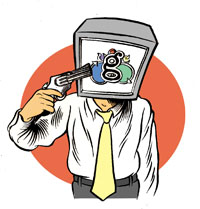GROKSTER TAKES A DIRT NAP
Remember Napster? Shawn Fanning’s killer application was like a diamond bullet shot into the blackened heart of the music business, leaving it reeling, and bleeding free music for years. The first reaction of the music biz moguls-men who invariably rely on their tender-aged assistants to send and receive email-was to ignore Napster.
Upon realizing somewhat belatedly you could get the Internet on computer nowadays, their second reaction was to kill it-smother it in lawsuits until it asphyxiated in amicus briefs. After kicking Napster to the curb, they sent their goon squad — i.e., the Recording Industry Association of America (RIAA) — after the rats scurrying in the bowels of their pirate ship. To date the RIAA has sued more than 14,000 individuals — in many cases, the parents of illegal downloaders-for copyright infringement, seeking upward of a million dollars in damages per case.
In one notable instance a Michigan mom named Candy Chan was sued by members of the RIAA. When prosecutors realized they’d have a stronger case against Chan’s daughter instead, they motioned to dismiss the suit and brought charges against the kid. Sheesh, suing children-your law school professors must be so proud, counselor. Why not just give her a wedgie? Last week the RIAA bagged its second high-value target: Grokster.
“There are legal services for downloading movies and music. This service is not one of them.”
That’s the epitaph that currently greets would-be swashbuckling tune pirates when they pull up Grokster, one of the pioneering peer-to-peer file-sharing networks. After a protracted legal battle, Grokster cried uncle and reached a settlement with the RIAA wherein it would stop disseminating the software that made the file-sharing black market possible and reportedly cough up some $50 million in damages.
Grokster plans to have a legal paid-subscription service up and running soon, and is rumored to have forged an iTunes-style distribution deal with Sony BMG. A big black question mark looms over the future of other high-profile P2P sites such as KaZaA, eDonkey and BitTorrent that are still operating on the fringes of legality.
The straw that broke the Grokster’s back was a fuzzy Supreme Court ruling on “third-party copyright infringement” back in the spring. Basically, the Court ruled that the makers of file-sharing software can be sued if somebody uses that software to violate copyright law, and it can be demonstrated the copyright violation was encouraged by the manufacturer. This essentially opens the door for holding manufacturers liable for crimes committed by the consumers of their products. Gun manufacturers must be shitting their pants.
Oh wait. Congress recently passed a shield law protecting gun manufacturers from legal jeopardy if a customer kills or maims somebody with their product-at the behest of the big guy in the Oval Office.
“The president looks at it as a matter of stopping lawsuit abuse,” said White House spokesperson Scott McClellan. “We do not believe a manufacturer of a legal product ought to be held accountable for the criminal misuse of that product.”
So what’s the difference between making a product that allows you to share music files and making a product that allows you to kill and maim? Why, bazillions of dollars in special-interest money, of course. At long last we have government by the corporations, for the corporations. To the executive, judicial and legislative branches of the federal government, let me be the second to say: You’re doin’ a heckuva job, Brownie.

